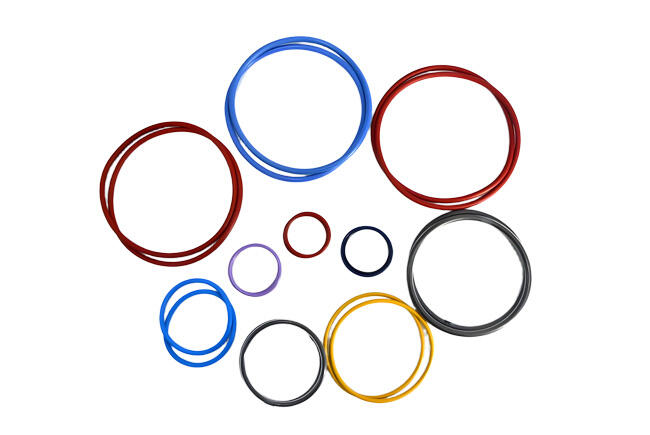Teollisten toimitusketjujen todellisessa maailmassa tiettyjen tuotteiden merkitys tulee yleensä oikeesti näkyviin vasta kun jotain menee pieleen. O-renkaat ovat tästä hyvä esimerkki. Suurin osa käyttäjistä ei mieti niiden kuntoon asti, että vuoto pysäyttää tuotannon tai moottori kieltäytyy käynnistymästä kylmässä säässä. FVMQ O-renkaat ovat tulleet osaksi useiden toimialojen näkymätöntä varmuuspoliittista suojaa, erityisesti tilanteissa, joissa matala lämpötila ja kemikaalialtistus kohtaavat suoraan.
Ajatellaan autojen jälkimarkkinoita. Polttoainesuuttimen tiiviste, joka on altistunut agressiivisille bensiinisekoille Pohjois-Euroopassa, kohtaa sekä kemiallista rasitusta että pakkasia talviaamuja. Perinteiset silikonia O-renkaat kovettuisivat; fluorikarbonitiivisteet saattaisivat kutistua. Fluorosilikonia O-renkaat selviytyvät molemmista olosuhteista, mikä auttaa mekanismeja välttämään toistuvia korjauksia. Sama logiikka pätee ilmailualalla: täyttöjärjestelmät, toimilaitteet ja säätöventtiilit vaativat kaikki komponentteja, jotka eivät pettäessä lannistu, kun ympäristön lämpötila vaihtelee –50 °C:sta korkeudessa moottorin läheisten kuumaan pintaan.
Raskauden koneenrakennuksen ja robotiikan alalla FVMQ-O-renkaat esiintyvät usein hydraulijärjestelmissä, joissa öljy sisältää lisäaineita, jotka vahingoittaisivat nopeasti silikonia, mutta joissa kylmäkäynnistysteho on silti vaadittu. Jakelijoiden kannalta tämä tarkoittaa sitä, että materiaalia ei tilata päivittäin, mutta kun tilaus tulee, aikataulu on ehdoton. Kaivostoiminta tai teollisuusrobotin tuotantolinja ei voi sallia kolmen viikon toimitusaikaa pienelle tiivisteelle.
Yksi mielenkiintoinen keskustelunaihe tukkukauppiaiden keskuudessa on hinnoittelu. Asiakkaat kysyvät joskus: "Miksi tämä O-rengas on kalliimpi kuin musta kumirengas?" Rehellinen vastaus on kestävyys oloissa, joissa edullisemmat kumit eivät kestä. Jakelijan näkökulmasta kyse on kuitenkin yhtäältä myös tavaravirran hallinnasta. Liian paljon varastoituna kapeiden FVMQ-osien varastoa sitoo pääomaa; liian vähän varastoa taas vaarantaa luotettavuuden, kun asiakkaat tarvitsevat osia nopeasti. Toimittajat, jotka auttavat selvittämään tätä ongelmaa tarjoamalla sekä syvää varastoa standardituotteista että nopeaa räätälöintiä epätavallisiin tilauksiin, ovat usein niitä, jotka säilyttävät pitkän ajan jakelijoiden uskollisuuden.

NQKSF on rakentanut maineensa juuri näiden kivijalkojen osoittamiseen. Tiimien teknisten ansioiden lisäksi strategia perustuu palveluun ja luotettavuuteen:
· Standardiosat toimitetaan nopeasti: Tuhatkuntaa O-renkaita ja öljytiivisteiden kokoja on varastossa, joten kiireiset tilaukset käsitellään viivästyksittä.
· Kokonaisvaltainen räätälöinti: Sovellusympäristön arviointien testattujen prototyyppien toimitukseen asti NQKSF auttaa OEM-valmistajia ja jakelijoita täyttämään ainutlaatuiset vaatimukset.
· Teknisen järjestelmän tuki: Kymmenien vuosien asiantuntemusta hyödynnetään ei ainoastaan tuotteiden myyntiin vaan myös tiivisteiden tehoon, huoltokustannusten alentamiseen ja laitteen käyttöiän pidentämiseen.
Lisäksi heidän asemansa alalla – fyysinen valmistustehdas, joka on tunnustettu tiivisteteknologian johtavana toimijana, joka vie tuotteitaan yli 80 maahan ja on tunnustettu korkean teknologian yritykseksi ja innovaatiokeskukseksi – selittää miksi globaalit jakelijat luottavat siihen, että voivat tehdä pitkäaikaisia sopimuksia.
Lopulta FVMQ-O-renkaat merkitsevät enemmän kuin ainoastaan materiaaliseosta. Ne edustavat strategista lähestymistapaa laitteen luotettavuuteen. Insinöörille se tarkoittaa komponentteja, jotka eivät petä kuormitustilanteessa. Jakelijalle taas se tarkoittaa toimittajan valintaa, joka tarjoaa sekä tuotetta että luottamusta.
Kilpailukykyisessä markkinassa, jossa jopa pienet viiveet voivat keskeyttää tuotannon, brändit kuten NQKSF osoittavat, että valmistajan, jolla on syvät tekniset juuret, laaja varastovalikoima ja sitoumus innovaatioon, erottelukyky voi olla ratkaiseva tekijä tilauksen menettämisen ja kestävän kumppanuuden välillä.
 Uutiskanava
Uutiskanava